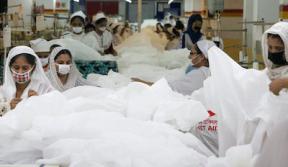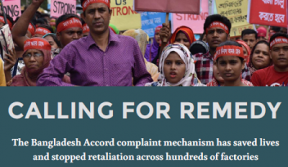06/16/17
A devastating fire in a Bangladesh textile mill at the beginning of this month reaffirms the need to extend and expand the Bangladesh Accord on Fire and Building Safety, due to end in May 2018. The Accord, established four years ago to improve structural, electrical and fire safety in Bangladesh's garment factories, entered its final year last month and is currently in the process of being renegotiated. While the Accord covers 2.5 million workers in the ready-made-garment industry, workers in Bangladesh's textile mills remain unprotected by this agreement.
On June 1, 2017 a fire broke out in the Pakiza Textile Ltd. in Savar, Bangladesh, injuring at least 21 workers. This fire demonstrates the ongoing dangers to textile workers in Bangladesh, many of whom are producing goods as part of global apparel supply chains. Textile facilities are burdened with the same life-threatening safety hazards that have been well-documented in factories engaged in garment assembly. Local media reports estimate that more than 100 workers have been killed or injured in factory fires in the textile sector since 2013.
Under the Accord, signatory brands and retailers are required to ensure necessary safety repairs are made to the factories where their clothes are assembled. There have been major safety improvements at the over 1600 factories covered by the Accord, but critical safety concerns remain at factories that fall outside of its scope. These include textile factories, spinning mills, leather tanneries, and apparel washing facilities. While the goods produced in these facilities are destined for export, there are no binding obligations for the Accord's signatory companies sourcing from them. These workplaces remain uninspected and unsafe, risking the lives of thousands of workers.
Ineke Zeldenrust from Clean Clothes Campaign states, "Workers in textile factories often work for the same garment brands as those in Accord-inspected factories, but still have to risk their lives in unsafe workplaces. Brands should be aware that proper due diligence does not stop at those workers that stitch their clothes, but also covers the workers who are spinning, weaving and dyeing their textiles."
The four witness signatories to the Accord -- International Labor Rights Forum, Worker Rights Consortium, Clean Clothes Campaign and Maquila Solidarity Network -- therefore reiterate their call from April 2017 to broaden the scope of the Bangladesh Accord to cover all garment and home-textile facilities producing for export. These labor rights groups call upon the 216 apparel companies that have signed the Accord to take action to protect the safety of all workers in their supply chains.
Ensuring that the textile industry is covered by a transparent and inclusive program of safety inspections is an essential step towards preventing future injury and death. In the meantime it is essential not to forget those workers injured and killed in previous tragedies. The Pakiza workers should be compensated for their suffering and loss of income and be spared the fate of the families affected by the Aswad Composite Mills fire of October 8, 2013, who after all these years are still waiting for adequate compensation.

